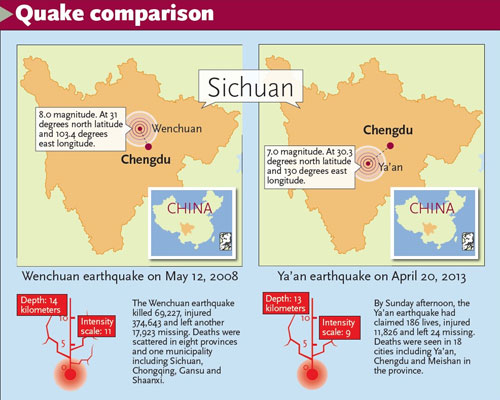Cash donations flood in on Weibo


Cash donations have flooded into the earthquake-jolted Sichuan Province via online charity platforms based on the microblog service, an increasingly popular non-governmental channel.
Sina Micro-charities, which was launched this February, had initiated 29 quake relief projects with the help of institutions and individuals for the hardest-hit city of Ya'an by Sunday morning, according to a notice posted on the platform late Sunday.
The Sina Micro-charity projects, which allow the public to donate money with debit cards, credit cards or the online payment platform Alipay, have gathered nearly 80.4 million yuan ($13.01 million) from more than 60,000 Internet users.
Meanwhile, other Internet service providers offering online payment platforms, including Tencent and Alipay, have collected tens of millions of yuan in donations for the quake-hit areas.
Deng Guosheng, director of the NGO Research Center at Tsinghua University, told the Global Times that many donors are turning to non-governmental channels after the scandal-plagued Red Cross Society of China took a big hit to its credibility.
"The Red Cross has to be transparent on how the money is used and boost its efficiency in order to pick up its credibility," he said.
A spokesperson for the Red Cross, Tao Yijun, told the Global Times Sunday that the institution had confirmed 51 million yuan in donations as of late Saturday.
"But the amount is still rising rapidly and several of its subsidiaries haven't reported how much they have collected," he added.
Among the projects initiated by Sina, the "Hope project of financing students in Ya'an," which was launched by the China Youth Development Foundation, had gained some 38 million yuan by late Sunday. Sina Micro-charity's "Donate to the stricken area in Ya'an" project gathered nearly 13 million yuan.
Liao Dong, founder of the online gaming website 91wan.com, who contributed the most to "Donate to the stricken area in Ya'an" with 910,000 yuan, told the Global Times that he chose this platform because it's "more transparent."
Wang Zhenyao, president of Beijing Normal University's One Foundation Philanthropy Research Institute, told the Global Times that the platform offers information in a way that allows donors to know where their money is going.
"The purpose of each micro-charity project is clear and highly targeted, and the project timelines track how the funds are utilized," Wang said. "This reassures people and makes them want to donate."
Deng said that charity funds prefer micro-charities to other traditional means because charity projects spend less on promotions online than on TV or in newspapers. The platform also eliminates the inconvenience for donors of traveling to a bank and waiting in line to write a check.
"The whole process takes a couple of clicks and the time taken is almost zero," Deng said. "That makes micro-charities attractive."
